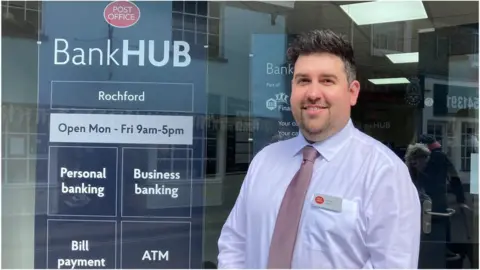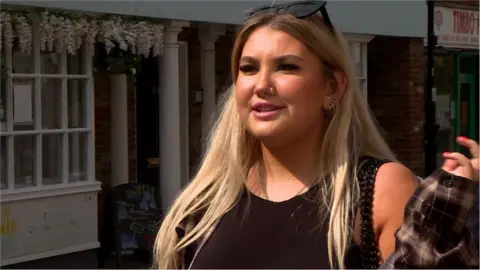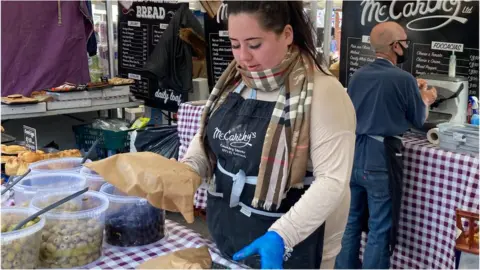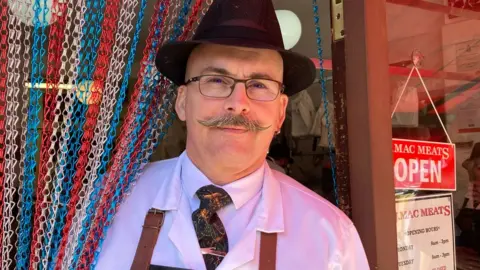Saving cash: A customer said we'd changed her life
 BBC
BBCPaying in a cheque, depositing cash, and withdrawing money without being charged, all used to be easy in the bustling centre of Rochford in Essex.
That was until the last bank in town closed its doors more than three years ago. Since then, the town's population of 20,000 people have needed to make a more complex journey for a simple financial task.
That was too much for some of its elderly and vulnerable residents - until now, when they have been given what locals describe as a "godsend".
A new bank hub, run by the Post Office and shared by five mainstream banks, has opened in a former carpet shop just off the market square.
Every weekday there is a counter service, an automatic deposit machine, and a free-to-use ATM. Each day, a member of staff from a different bank comes in to help with trickier transactions.
"One lady came in to say 'thank you, you have changed my life', and that's not an understatement," says Richard Fleetwood, postmaster at the Rochford Bank Hub.
"To have this on the doorstep has been a lifeline."

On a busy market day, it is hard to find anyone - young or old - who is not relieved to have the new hub in town.
"This is a really good thing for the community," says mother-of-two Lisa Saunders. "I do internet banking but it is handy having somewhere here that you can go to."
Young hairdresser Freya Draper says it makes paying in the cash tips she receives far less of a hassle.
"Normally, I have to wait until the end of the month and go into Southend to pay it all in, but I can do it as and when now," she says.
Rochford is one of eight communities across the UK trialling different ways to ensure residents have access to cash.
The pandemic has accelerated the closure of bank branches, the disappearance of free-to-use ATMs, and has cut the use of notes and coins.
While cash use may be dwindling, research by the City regulator - the Financial Conduct Authority - found five million people in the UK are still dependant on it.
Experience from Sweden also suggests shops will start refusing notes and coins if cash becomes uneconomic to handle.
Face-to-face banking
The trials - funded by the UK's main banks and the Post Office - are testing ways to make it easier for small businesses and consumers to deposit and exchange cash, without having to travel miles to their nearest bank.
Free cashback from stores instead of ATMs, automated deposit machines, and face-to-face help in pop-up banks are all being tested.
The other trials are taking place in Botton village in North Yorkshire, Burslem in Staffordshire, Lulworth Camp army barracks in Dorset, Millisle in County Down, Cambuslang in South Lanarkshire, Denny in Falkirk, and Hay-on-Wye in Powys .
In Rochford, it is not just the bank hub being put to the test. A scheme, run by a business called Shrap, allows loose change to be loaded onto a card or an app - instead of being given in small denomination copper and silver coins.
The money can be saved, built up, and then spent via the card or a phone in local shops.
Traders like the idea of cutting the cost of handling cash, as well as not having to travel miles to pay it in. They would also welcome cheaper bank charges - not something these trials is looking to address.

Whatever the method of paying, the difficulties of recent lockdowns mean they are grateful for consumers spending with them again. Anything that makes it more convenient, from a bank hub to a queue-free ATM is welcome.
"If they want to give us cash or card, we are happy either way," says Tiffany Tobli, on the McCarthy's bakery market stall. "As long as we are getting our money, we are happy!"
The reality is that coins are becoming an infrequent way to pay. The Royal Mint has no plans to make new 2p or £2 coins for the next 10 years.
Natalie Ceeney, author of the Access to Cash Review who is overseeing this project, says that is no reason to let cash die out.
"Cash remains critically important, not only as a back-up when payment systems go down, but for millions of people who can't use digital payments, don't have reliable broadband or mobile coverage, or simply cannot afford or don't have access to wider banking services that many of us take for granted," she says.
"If small businesses can literally pop out for five minutes and bank their takings, rather than drive to the next town, find a parking space and then queue for 20 minutes, then it will hopefully stop businesses from deciding to go cashless because of the cost and hassle of banking cash."

The trials will run until October, and she hopes the most successful ones will be adopted nationwide. She is also calling on the government to legislate to ensure the long-term future of the cash infrastructure network.
The Federation for Small Businesses is warning that small businesses should not be expected to act as an ATM in place of the banks, without a financial incentive.
But in Essex, there is pride among the locals that they are part of something new in the UK.
"Everything good starts in Rochford," says butcher Jason Macaree.
In fact, Rochford was said to be where King Henry VIII first set eyes on Anne Boleyn. That marriage ended badly. Everyone must hope the relationship today between customers, traders and the financial institutions that serve them fares somewhat better.
